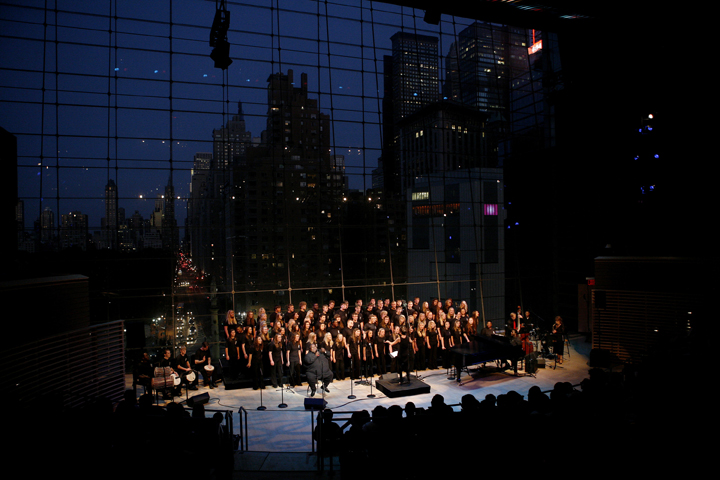In a concert presented by Distinguished Concerts International New York (DCINY) and dedicated to the memory of the great Gospel scholar Dr. Horace Clarence Boyer (1935-2009), the excellent choral conductor, Darcy Reese, led the Lincoln Gospel Choir and Swingsations Jazz Choir, along with the Twin Cities Gospel Choir and their amazing vocalist, Robert Robinson, in engaging, moving and beautifully prepared performances of stylistically versatile works that told the evolution of Africans during the last 400 years. Normally, this type of evening might be held on Martin Luther King Day, but this story of wrong-doing, struggle and freedom could be told any time of year—and often. And normally, a choir of African-American descent might present this program, but here, the choruses were from Minnesota, an all-Caucasian group that took on the responsibility of the historical significance of this event and the demands of singing in authentic African, Jazz, Blues and Gospel styles. To say they were successful would be an understatement. And they brought down the packed house at Lincoln Center. The students in the choir, who sang from memory, are high school-age, yet their collective voices, commitment and choreography (Patricia Brown, director) were presented at a high, professional level. All the professional instrumentalists, mostly comprised of drummers led by Ahanti Young, were terrific as well.
In Otieno’s arrangement of “Sigalagala” and Marsh’s arrangement of “Ain’t Too Proud to Beg”, Zach Bauer, a young singer in the chorus, was excellent, singing first in authentic African dialect and later in a convincing Soul/R&B style. The Choreography of five dancers at the beginning of the evening was interesting, but the dancing talent among the students was not the concert’s sure-fire strength. In “Denko”, Hailey Bayne sang with a lovely voice. In Barnwell’s Spirituals, Robert Robinson was the epitome of heartfelt emotion. David Stenson’s tone was a bit shaky in his portrayal of Dell’s “Nobody Knows the Trouble I See”, but singing after Robinson is a very tough act to follow. Becca Kruta and Brenna Skallet (from the chorus) sang “Way Beyond the Blue” with great confidence and spirit, although the harmonizations were slightly off pitch. “Hold On” was sung with a unified sense of diction, swing and phrasing, especially with the word ‘everything’ in “everything will be all right”, which had snazzy zip in the fast-rising crescendo on the first two syllables and the punchy staccato on the third syllable. “I Wanna Die Easy When I Die” was sung absolutely gloriously by Robinson and the choir, which swayed with deep devotion. The Twin Cities Gospel Choir is a force to be reckoned with. The Saxophonist Kathy Jensen was excellent throughout.
“Great Day” and “If I had a Hammer”, performed back-to-back, were tied in to the Civil War of the 1860’s and the Civil Rights Movement of the 1950s, incorporating Jazz and Blues. A characterization of Rosa Parks was fitting but a bit jarring after mention of the 1860s. “I’ll be Alright” and “We Shall Overcome” were sung with great Gospel feeling. Gershwin’s Piano Prelude, which followed the bit of narration: “…but they had their jazz” doesn’t work because Gershwin wasn’t exactly African American; for the sake of the program, it would have been better to have talented young pianist Brianna Drevlow (from the chorus) learn some Art Tatum or a Duke Ellington arrangement instead. The Gershwin, in any case, was played with impressive flair— albeit too much hurry. Ahanti Young was the marvelous vocal percussionist (a la Bobby McFerrin) in Marsh’s arrangement of “Don’t You Worry ‘bout a Thing” against a cappella chorus that was only off pitch a few times.
In the final section, in which the presence of Gospel scholar, Dr. Boyer, was truly felt, and in which the audience was invited to participate, every successive number—complete with clapping and choreographed choral movement– sounded like it couldn’t be topped, but it was. “Do You Know the Light”, with its rapid-fire, layered entrances were infectious and intoxicating, drawing to mind some of the dizzying scenes in the film “The Blues Brothers.” But this was more than spectacle; these young kids from Minnesota somehow had an innate, profound understanding of the history of Africans and African Americans, and that devotion always transmitted to the audience with great poignancy. This chorus and these soloists sang with chemistry and conviction all the way through this marathon program of two and a half hours (without intermission). That of course is the least they could do, considering how much Africans and African Americans have had to endure throughout history. This presentation, which should be repeated as much as possible, has the ability to be as timeless or important as the novel “To Kill a Mockingbird” or the Spielberg film “Amistad.” Everyone on stage seemed very proud of non-existing prejudice, a prejudice that seems to have finally disappeared during this time of the first African-American presidency, four hundred years after slavery began.

